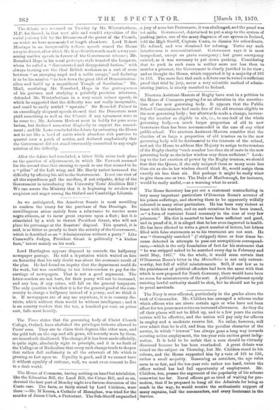The debate was resumed on Tuesday by Mr. Winterbotham, M.P.
for Stroud, in that -very able and candid exposition of the social jealousy felt by the Dissenters of the power of the Church, on which we have commented at length elsewhere. Lord Robert Montagu in all inexpressibly tedious speech scared the House away to dinner, after which Mr. K-ty-Sliti ttleworth made a very pro- mising maiden speech in favour of the Government scheme ; Mr. Beresford Hope in his usual grotesque style taunted the Leaguers, whom he called a "discontented and disappointed faction," with always trotting out the ideal British workman as a sort of cross between "an avenging angel and a noble savage," and declaring it to be his mission "to hew down the great idol of Denomination- alism and build up a magnificent Temple of Secularism." Mr. Mall, emulating Mr. Beresford. Hope in the grotesqueness of his gestures and studying a painfully precisiau utterance, defended Mr. Winterbotham in a very much calmer speech, in which he suggested that the difficulty was not really insuperable, and could be easily settled " upstairs." Sir Roundell Palmer in an exceedingly eloquent speech showed that the Dissenters must yield something as well as the Church if any agreement were to be come to ; Mr. Auberon Herbert went in boldly for pure secu- larism, but declined somewhat illogically to support the amend- ment; and Mr. Lowe concluded the debate by entreating the House not to act like a herd of cattle which abandons rich pastures to quarrel over a patch of nettles, and declared emphatically that the Government did not stand irrevocably committed to any single solution of the difficulty.








































 Previous page
Previous page